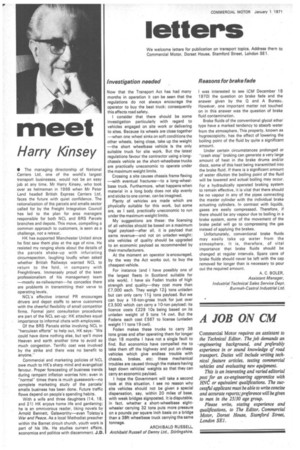letters
Page 36

If you've noticed an error in this article please click here to report it so we can fix it.
We welcome letters for publication on transport topics. Address them to Commercial Motor, Dorset House, Stamford Street, London SE1.
Investigation needed
Now that the Transport Act has had many months in operation it can be seen that the regulations do not always encourage the operator to buy the best truck: consequently this affects road safety.
I consider that there should be some investigation particularly with regard to vehicles engaged on site work or delivering to sites, Because its wheels are close together —when one wheel sinks on soft conditions the other wheels, being close, take up the weight —the short wheelbase vehicle is the only suitable truck for site work. But the latest regulations favour the contractor using a longchassis vehicle as the short-wheelbase trucks are practically uneconomic to operate under the maximum weight limits.
Crossing a site causes chassis frame flexing —with eventual fractures—to a long-wheelbase truck. Furthermore, what happens when material in a long body does not slip evenly and sticks to one corner, can be imagined.
Plenty of vehicles are made which are physically suitable for this work, but some are, as I said. practically uneconomic to run under the maximum weight limits.
My suggestions are these: the licensing of all vehicles should be based on a maximum legal payload—after all, it is payload that eams revenue—and not on unladen weight; site vehicles of quality should be upgraded to an economic payload as recommended by their manufacturers.
At the moment an operator is encouraged. by the way the Act works out, to buy the cheapest vehicle.
For instance (and I have possibly one of the largest fleets in Scotland suitable for site work), I have six Foden trucks of high strength and quality—they cost more than £7,000 each, They weigh 12+ tons unladen but can only carry 111 tons payload. But we can buy a 16-ton-gross truck for just over £3,500 which can carry a 10-ton payload; its licence costs £229 10s being based on its unladen weight of 5 tons 14 cwt. But the Fodens each cost £567 to license (unladen weight 11 tons 19 cwt).
Foden makes these trucks to carry 38 tons gross and after operating them for longer than 18 months I have not a single fault to find. But economics have compelled me to take them off the highway and put on cheap vehicles which give endless trouble with chassis, brakes, etc; these mechanical troubles are caused through the makers having kept down vehicles' weights so that they can carry an economic payload.
I hops the Government will take a second look at this situation. I see no reason why site vehicles should not be given a special dispensation, say, within 20 miles of base, with weak bridges signposted. It is disputable, in fact, whether a short-wheelbase eightwheeler carrying 32 tons puts more pressure on a pounds per square inch basis on a bridge than a 38ft wheelbase truck carrying the same tonnage.
ARCHIBALD RUSSELL, Archibald Russell of Danny Ltd., Stirlingshire
Reasons for brake fade
I was interested to see (CM December 18 1970) the question on brake fade and the answer given by the CI and A Bureau. However, one important matter not touched on in this answer was the question of brake fluid contamination.
Brake fluids of the conventional glycol ether type have a marked tendency to absorb water from the atmosphere. This property, known as hygroscopicity, has the effect of lowering the boiling point of the fluid by quite a significant amount.
Under certain circumstances prolonged or "crash stop" braking can generate a very large amount of heat in the brake drums and/or discs, some of this heat being transmitted into the brake fluid. If there is-a significant amount of water dilution the boiling point of the fluid will be lowered and actual boiling may occur. For a hydraulically operated braking system to remain effective, it is vital that there should be no vapour in any of the pipes connecting the master cylinder with the individual brake actuating cylinders. In contrast with liquids, gases are easily compressed. Therefore, if there should be any vapour due to boiling in a brake system, some of the movement of the brake pedal will go to compressing the gas instead of applying the brakes.
Unfortunately, conventional brake fluids may easily take up water from the atmosphere. It is, therefore, of vital importance that brake fluids should be changed at regular intervals. Spare cans of brake fluids should never be left with the cap removed for longer than is necessary to pour out the required amount.
A. C. BOLER, Assistant Manager, Industrial Technical Sales Service Dept. Burmah-Castrol Industrial Ltd.




















































































